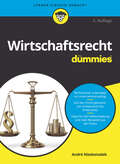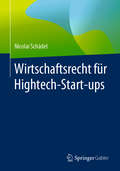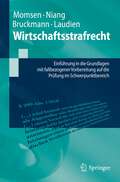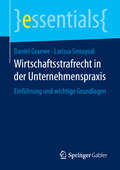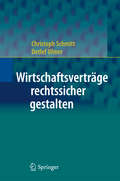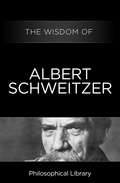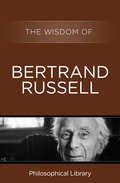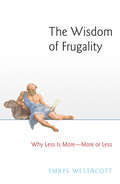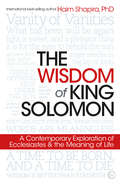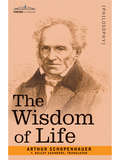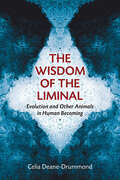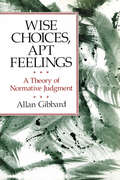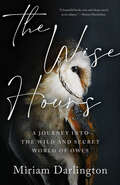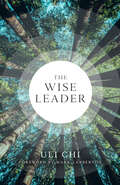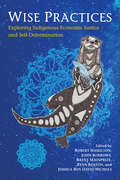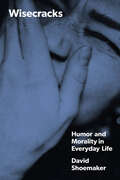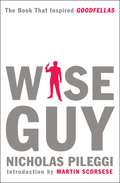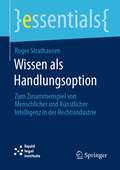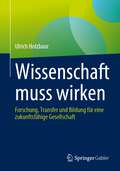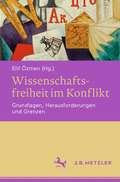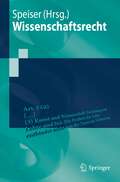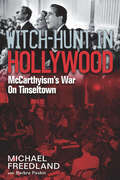- Table View
- List View
Wirtschaftsrecht für Dummies (Für Dummies)
by André NiedostadekDas Wirtschaftsrecht ist ein weites Feld. André Niedostadek behandelt in seinem Buch die wirtschaftsrelevanten Kerngebiete des Bürgerlichen Rechts und des Handels- und Gesellschaftsrechts ebenso wie beispielsweise auch das Arbeitsrecht, den Gewerblichen Rechtschutz oder das Wettbewerbs- und Kartellrecht. Viele Beispiele aus dem Alltag machen die gesamte Rechtsmaterie anschaulich. So sind Sie in der Jura-Klausur und in der Unternehmenspraxis immer rechtsicher unterwegs!
Wirtschaftsrecht für Hightech-Start-ups
by Nicolai SchädelViele Start-ups scheitern. Gelegentlich scheitern besonders originelle Geschäftsmodelle am Recht. Das muss nicht so sein. Aber Unternehmer, die keine Rechts-, sondern lieber Wirtschaftsgeschichte schreiben wollen, sollten das Recht von Beginn an in den Blick nehmen. Denn das Ausblenden der durch das Recht gesetzten Marktrahmenbedingungen macht eine Unternehmung ähnlich riskant wie das Ignorieren von Kundenwünschen, das Unterschätzen der Wettbewerber oder das Überschätzen technischer Möglichkeiten. Dieses Werk soll dazu beitragen, dass dem Recht bei Start-up-Projekten mit technikbasierten Geschäftsmodellen von vorneherein ebenso Aufmerksamkeit geschenkt wird wie den betriebswirtschaftlichen und technischen Fragen, um das Risiko des Scheiterns zu verringern. Gründern mit betriebs- oder ingenieurwissenschaftlichem Hintergrund sollen etwaige Berührungsängste mit dem deutschen Wirtschaftsrecht genommen, ihren rechtlichen Beratern die eine oder andere neue Sichtweise aufgezeigt werden.
Wirtschaftsstrafrecht: Einführung in die Grundlagen mit fallbezogener Vorbereitung auf die Prüfung im Schwerpunktbereich (Springer-Lehrbuch)
by Carsten Momsen Adja Lea Niang Philipp Bruckmann Sebastian LaudienDieses Lehrbuch legt besonderes Augenmerk auf den Kernbereich des Wirtschaftsstrafrechts und diejenigen Bereiche des Nebenstrafrechts, die für Schwerpunkt- und Staatsprüfungen sowie den Einstieg in die Praxis den relevanten Teil des Wirtschaftsstrafrechts darstellen. Hierzu zählen etwa das Arbeits- wie auch das Umweltstrafrecht, ebenso das Kartell-, Kapitalmarkt- und Insiderstrafrecht. Hinzu kommt ein Überblick über den Kernbereich des Steuerstrafrechts. Neben der systematischen und zur Prüfungsvorbereitung bestens geeigneten Darstellung der dogmatischen Besonderheiten des Wirtschaftsstrafrechts und seiner zentralen Tatbestände werden aktuelle Fragen wie das Korruptionsstrafrecht mit seinen internationalen Bezügen und der Gesetzgebung zur Bekämpfung der Korruption im Sport oder die Praxis der Criminal Compliance vertieft diskutiert. Eingeschlossen sind dabei die relevanten internationalen Bezüge des betreffenden Rechtsbereichs in der Praxis sowie das zugehörige Sanktionsrecht. Die Darstellung nimmt darüber hinaus das unmittelbar zugehörige Ordnungswidrigkeitenrecht sowie verfahrensrechtliche Besonderheiten in Bezug. Die Darstellung an Fällen wird einerseits der durch Leitentscheidungen geprägten Fortentwicklung gerecht. Sie gewährleistet zugleich Aktualität und den notwendigen Bezug zum spezifischen und in der Praxis besonders relevanten Verfahrens- und Sanktionsrecht.Das Werk schließt mit einer Reihe von Fallbeispielen auf Niveau der Abschlussklausuren im Schwerpunktbereich.
Wirtschaftsstrafrecht in der Unternehmenspraxis: Einführung Und Wichtige Grundlagen (Essentials)
by Daniel Graewe Larissa SenuysalDaniel Graewe und Larissa Senuysal gehen in diesem essential vor dem Hintergrund der historischen Entwicklung und der kriminologischen Grundlagen praxisnah und anschaulich auf den allgemeinen Teil des Wirtschaftsstrafrechts ein, wobei sie den Fokus auf die Sicht des Unternehmens legen. Mit typischen Fallkonstellationen verdeutlichen die Autoren dabei die Materie. Das Wirtschaftsstrafrecht ist ein topaktueller und hochkomplexer Teil des Rechtssystems. Kaum ein anderes Teilgebiet des Strafrechts entwickelt sich so dynamisch und ist gleichzeitig so präsent in den Medien vertreten – wie etwa „VW-Abgasaffäre“, „Deutsche Bank“, „Karstadt“. Vor diesem Hintergrund ist es für Manager, Mitarbeiter und Gesellschafter von Wirtschaftsunternehmen essenziell, zumindest die Basics auf diesem Gebiet zu beherrschen.
Wirtschaftsverträge rechtssicher gestalten
by Christoph Schmitt Detlef UlmerMit Verträgen sollen wirtschaftliche Ziele umgesetzt werden. Das gelingt nur deshalb, weil Regeln darüber bestehen, welches Verhalten durch Verträge bewirkt und im Streitfall erzwungen werden kann. Früher orientierten sich Vertragsinhalte vornehmlich daran, was die Vertragsparteien wollten, heute sind sie zunehmend an die Wertvorstellungen des Gesetzgebers gebunden. Das Buch hilft dabei, die Konsequenzen zu überschauen, die sich daraus für die Vertragsparteien ergeben, die wirtschaftlichen Folgen zu erkennen und vertraglich zu gestalten.
The Wisdom of Albert Schweitzer (Wisdom)
by The Wisdom SeriesReverence for Life—Albert Schweitzer&’s pivotal philosophyMusician, physician, humanitarian, and philosopher, Albert Schweitzer was a twentieth-century Renaissance man who won the Nobel Peace Prize for his &“Reverence for Life&” philosophy. The Wisdom of Albert Schweitzer explores this core philosophy, which inspired one of the world&’s great humanitarians. While traveling in Africa, Schweitzer recognized that all living creatures have a will to live and believed that through a &“reverence for life&” mankind had an ethical imperative to aid in the welfare of all living things, including the environment. His words have remained an inspiration for generations of humanitarians and environmentalists.
The Wisdom of Albert Schweitzer (Wisdom)
by The Wisdom SeriesReverence for Life—Albert Schweitzer&’s pivotal philosophyMusician, physician, humanitarian, and philosopher, Albert Schweitzer was a twentieth-century Renaissance man who won the Nobel Peace Prize for his &“Reverence for Life&” philosophy. The Wisdom of Albert Schweitzer explores this core philosophy, which inspired one of the world&’s great humanitarians. While traveling in Africa, Schweitzer recognized that all living creatures have a will to live and believed that through a &“reverence for life&” mankind had an ethical imperative to aid in the welfare of all living things, including the environment. His words have remained an inspiration for generations of humanitarians and environmentalists.
The Wisdom of Bertrand Russell (Wisdom)
by The Wisdom SeriesAn A-to-Z compendium of Russell&’s writingOne of the great minds of the twentieth century, Bertrand Russell explored philosophy, mathematics, and a variety of other intellectual, political, historical, and social issues in his lifetime. In this indispensable and easily accessible guide, drawn from his books and essays, readers will find Russell&’s fundamental principles, from objectivity to ontological arguments to logical certainty, in his own words. Russell also explored topics such as war, evil, and the purpose and goal of human existence. Russell&’s intellect transcends time and remains a relevant source of inspiration and thought today.
The Wisdom of Bertrand Russell (Wisdom)
by The Wisdom SeriesAn A-to-Z compendium of Russell&’s writingOne of the great minds of the twentieth century, Bertrand Russell explored philosophy, mathematics, and a variety of other intellectual, political, historical, and social issues in his lifetime. In this indispensable and easily accessible guide, drawn from his books and essays, readers will find Russell&’s fundamental principles, from objectivity to ontological arguments to logical certainty, in his own words. Russell also explored topics such as war, evil, and the purpose and goal of human existence. Russell&’s intellect transcends time and remains a relevant source of inspiration and thought today.
The Wisdom of Frugality: Why Less Is More - More or Less
by Emrys WestacottFrom Socrates to Thoreau, most philosophers, moralists, and religious leaders have seen frugality as a virtue and have associated simple living with wisdom, integrity, and happiness. But why? And are they right? Is a taste for luxury fundamentally misguided? If one has the means to be a spendthrift, is it foolish or reprehensible to be extravagant?In this book, Emrys Westacott examines why, for more than two millennia, so many philosophers and people with a reputation for wisdom have been advocating frugality and simple living as the key to the good life. He also looks at why most people have ignored them, but argues that, in a world facing environmental crisis, it may finally be time to listen to the advocates of a simpler way of life.The Wisdom of Frugality explores what simplicity means, why it's supposed to make us better and happier, and why, despite its benefits, it has always been such a hard sell. The book looks not only at the arguments in favor of living frugally and simply, but also at the case that can be made for luxury and extravagance, including the idea that modern economies require lots of getting and spending.A philosophically informed reflection rather than a polemic, The Wisdom of Frugality ultimately argues that we will be better off--as individuals and as a society--if we move away from the materialistic individualism that currently rules.
The Wisdom of King Solomon: A Contemporary Exploration of Ecclesiastes and the Meaning of Life
by Haim ShapiraIn the Book of Ecclesiastes the main character, already rich in material wealth, seeks wisdom and looks upon the lessons of his own life. Inspired by that search, bestselling philosopher Haim Shapira muses on the perennial questions most relevant to our lives.Ecclesiastes is among the most poetic books of the Old Testament, full of famous and resonant verses: 'Vanity of vanities, all is vanity'; 'A time to weep and a time to laugh, a time to mourn and a time to dance'; 'I have seen all the things that are done under the sun; all of them are meaningless, a chasing after the wind'. It is traditionally attributed to King Solomon (r. 970-930 BC), who advises us to avoid seeking happiness in worldly things and focus instead on the eternal truths.The book poses many vital questions: Is life nonsense and suffering or bliss? Is there any meaning to our actions under the sun? What will happen at the end? Is there any advantage to wisdom? Why can't a just regime be established? What are the relationships between happiness and wealth? What is the source of emotions and what do we know about desires? Can knowledge of death serve as a guide to life? King Solomon does not instruct us to think like him, nor does he guide us towards a particular path. Ecclesiastes sends us on a journey into The Valley of Great Questions: Abel, man, world, labor, advantage, sun, goodness, time, light, evil spirit, wisdom, love, fear of God, death, and more...Haim Shapira's rich and rigorously informed analysis allows King Solomon's voice to speak to us across the millennia, offering remarkably up-to-the-minute insights for people of all faiths and none. If you want advice about living a better life (and to learn about the meaning of life), would it not be wise to receive it from King Solomon – the wisest man of all time?
The Wisdom of Life
by Arthur SchopenhauerA disciple of Kant and a significant factor in shaping Nietzsche's thinking, Arthur Schopenhauer worked from the foundation that all knowledge derives from our experience of the world, but that our experience is necessarily subjective and formed by our own intellect and biases: reality, therefore, is but an extension of our own will. In this essay, translated by THOMAS BAILEY SAUNDERS (1860-1928) and first published in English in the 1890s, Schopenhauer explores concepts of what internal driving forces and external interpersonal dynamics contribute to the individual's happiness, from our own personalities to our wealth and social standing. The datedness of some of Schopenhauer's ideas--including a decidedly prefeminist interpretation of women's choices and a connection between fame and reputation that is no longer always active in our celebrity culture--only serve to highlight the philopher's basic assumption of human life: that it is characterized chiefly by misery. Students of philosophy and of 19th-century intellectualism will find this a fascinating read.
The Wisdom of the Liminal: Evolution and Other Animals in Human Becoming
by Celia Deane-DrummondA sophisticated theological anthropology that takes into account evolutionary theories and our relationships to other animals In this book Celia Deane-Drummond charts a new direction for theological anthropology in light of what is now known about the evolutionary trajectories of humans and other animals. She presents a case for human beings becoming fully themselves through their encounter with God, after the pattern of Christ, but also through their relationships with each other and with other animals. Drawing on classical sources, particularly the work of Thomas Aquinas, Deane-Drummond explores various facets of humans and other animals in terms of reason, freedom, language, and community. In probing and questioning how human distinctiveness has been defined using philosophical tools, she engages with a range of scientific disciplines, including evolutionary biology, biological anthropology, animal behavior, ethology, and cognitive psychology. The result is a novel, deeply nuanced interpretation of what it means to be distinctively human in the image of God.
Wisdom Won from Illness
by Jonathan LearCan reason absorb the psyche’s nonrational elements into a conception of the fully realized human being? Without a good answer to that question, Jonathan Lear says, philosophy is cut from its moorings in human life. He brings into conversation psychoanalysis and moral philosophy, which together form a basis for ethical thought about how to live.
Wise Choices, Apt Feelings: A Theory of Normative Judgment
by Allan GibbardThis book examines some of the deepest questions in philosophy: What is involved in judging a belief, action, or feeling to be rational? What place does morality have in the kind of life it makes most sense to lead? How are to understand claims to objectivity in moral judgments and in judgments of rationality? When we find ourselves in fundamental disagreement with whole communities, how can we understand out disagreement and cope with it? To shed light on such issues, Alan Gibbard develops what he calls a "norm-expressivstic analysis" of rationality. He refines this analysis by drawing on evolutionary theory and experimental psychology, as well as on more traditional moral and political philosophy. What emerges is an interpretation of human normative life, with its quandaries and disputes over what is rational and irrational, morally right and morally wrong. Judgments of what it makes sense to do, to think, and to feel, Gibbard argues, are central to shaping the way we live our lives. Gibbard does not hesitate to take up a wide variety of possible difficulties for his analysis. This sensitivity to the true complexity of the subject matter gives his treatment a special richness and depth. The fundamental importance of the issues he addresses and the freshness and suggestiveness of the account he puts forward, along with his illuminating treatment of aspects of sociobiology theory, will ensure this book a warm reception from philosophers, social scientists, and others with a series interest in the nature of human thought and action.
The Wise Hours: A Journey Into The Wild And Secret World Of Owls
by Miriam Darlington“A beautiful book; wise and sharp-eared as its subject.” —Robert Macfarlane One minute I was sipping my tea by the window. There was nothing but the palest edge of grey light and a wisp of steam from my cup—and then a shadow swooped out of the air. With the lightest of scratches, as if the dawn light was solidifying into life, there it was, perched like an exclamation mark on the balcony: an owl, come to my home. Owls have existed for over sixty million years, and in the relatively short time we have shared the planet with these majestic birds they have ignited the human imagination. But even as owls continue to captivate our collective consciousness, celebrated British nature writer Miriam Darlington finds herself struck by all she doesn’t know about the true nature of these enigmatic creatures. Darlington begins her fieldwork in the British Isles with her teenage son, Benji. As her avian fascination grows, she travels to France, Serbia, Spain, Finland, and the frosted Lapland borders of the Arctic for rare encounters with the Barn Owl, Tawny Owl, Long-eared Owl, Pygmy Owl, Snowy Owl, and more. But when her son develops a mysterious illness, her quest to understand the elusive nature of owls becomes entangled with her search for finding a cure. In The Wise Hours, Darlington watches and listens to the natural world and to the rhythms of her home and family, inviting readers to discover the wonders of owls alongside her while rewilding our imagination with the mystery, fragility, and magnificence of all creatures.
The Wise Leader
by Uli ChiLeading and mentoring begins with wisdom. Though we are overwhelmed with information, we often struggle to find true wisdom. Yet those leading or mentoring others, whether in business or in spiritual life, must rely on wisdom&’s guidance to lead with purpose and meaning. With decades of leadership experience in business, nonprofits, and Christian higher education, Uli Chi helps readers build this foundational virtue. Looking to Scripture as well as art and literature, Chi illuminates the nature of wisdom as fundamentally relational and other-centered. In the context of leadership, biblical wisdom shows us the importance of wielding power with humility. Chi also provides a framework for the formation of character and vision in the lifelong journey of gaining wisdom. Full of substantive and practical reflections, The Wise Leader both forms young leaders and teaches experienced leaders how to pass on the torch meaningfully.
Wise Practices: Exploring Indigenous Economic Justice and Self-Determination
by Robert Hamilton, John Borrows, Brent Mainprize, Ryan Beaton, Joshua NicholsIndigenous peoples in Canada are striving for greater economic prosperity and political self-determination. Investigating specific legal, economic, and political practices, and including research from interviews with Indigenous political and business leaders, this collection seeks to provide insights grounded in lived experience. Covering such critical topics as economic justice and self-determination, and the barriers faced in pursuing each, Wise Practices sets out to understand the issues not in terms of sweeping empirical findings but through particular experiences of individuals and communities. The choice to focus on specific practices of law and governance is a conscious rejection of idealized theorizing about law and governance and represents an important step beyond the existing scholarship. This volume offers readers a broad scope of perspectives, incorporating contemporary thought on Indigenous law and legal orders, the impact of state law on Indigenous peoples, theories and practices of economic development, and grounded practices of governances. While the authors address a range of topics, each does so in a way that sheds light on how Indigenous practices of law and governance support the social and economic development of Indigenous peoples.
Wisecracks: Humor and Morality in Everyday Life
by David ShoemakerA philosopher’s case for the importance of good—if ethically questionable—humor. A good sense of humor is key to the good life, but a joke taken too far can get anyone into trouble. Where to draw the line is not as simple as it may seem. After all, even the most innocent quips between friends rely on deception, sarcasm, and stereotypes and often run the risk of disrespect, meanness, and harm. How do we face this dilemma without taking ourselves too seriously? In Wisecracks, philosopher David Shoemaker examines this interplay between humor and morality and ultimately argues that even morally suspect humor is an essential part of ethical life. Shoemaker shows how improvised “wisecracks” between family and friends—unlike scripted stand-up, sketches, or serials—help us develop a critical human skill: the ability to carry on and find the funny in tragedy. In developing a new ethics of humor in defense of questionable gibes, Wisecracks offers a powerful case for humor as a healing presence in human life.
Wiseguy: The 25th Anniversary Edition
by Nicholas PileggiNicholas Pileggi&’s vivid, unvarnished, journalistic chronicle of the life of Henry Hill—the working-class Brooklyn kid who knew from age twelve that &“to be a wiseguy was to own the world,&” who grew up to live the highs and lows of the mafia gangster&’s life—has been hailed as &“the best book ever written on organized crime&” (Cosmopolitan).This is the true-crime bestseller that was the basis for Martin Scorsese&’s film masterpiece GoodFellas, which brought to life the violence, the excess, the families, the wives and girlfriends, the drugs, the payoffs, the paybacks, the jail time, and the Feds…with Henry Hill&’s crackling narration drawn straight out of Wiseguy and overseeing all the unforgettable action. &“Nonstop...absolutely engrossing&” (The New York Times Book Review). Read it and experience the secret life inside the mob—from one who&’s lived it.
Wissen als Handlungsoption: Zum Zusammenspiel von menschlicher und künstlicher Intelligenz in der Rechtsindustrie (essentials)
by Roger StrathausenWissen ist ein zentrales Element unternehmerischen Handelns. Nur, wer den Markt kennt und weiß, welche Probleme Kunden haben und wie diese sich mit neuen Produkten und Services lösen lassen, kann erfolgreich agieren. Dieses Buch untersucht die Auswirkungen der Digitalisierung auf die Rolle des Wissens in der Rechtsbranche. In Rechtsabteilungen und Kanzleien wandelt sich Wissen zunehmend von einem statischen Vorrats-Wissen zu einem dynamischen Ad-Hoc-Wissen, das durch den Einsatz von Software-Anwendungen bedarfsgerecht erzeugt wird und dem Erreichen eines bestimmten Zwecks dient. Dabei ist immer der jeweilige Geschäftskontext entscheidend für die Einsicht, was wie zu tun ist. Für Anwälte und alle, die an juristischen Transaktionen in Unternehmen beteiligt sind, bedeutet dies nicht nur, dass sie die allgemeinen Chancen und Risiken der digitalen Transformation kennen müssen. Sie müssen auch verstehen, wie sie neue Technologien dafür nutzen können, ihre eigene Kreativität zu stärken, informierte Entscheidungen zu treffen und im Team kooperativ zu einem gemeinsamen Ziel zu gelangen.
Wissenschaft muss wirken: Forschung, Transfer und Bildung für eine zukunftsfähige Gesellschaft
by Ulrich HolzbaurDieses Fachbuch ist ein mitreißender Appell und Leitfaden für mehr Wissenschaftlichkeit in der Gesellschaft und mehr gesellschaftliche Verantwortung in der Wissenschaft. Es zeigt auf, warum und wie die Gesellschaft wissenschaftsorientierter und die Forschung nachhaltiger werden müssen. Dabei geht es um Vertrauen und Transparenz, Verstehen und Verständlichkeit, Nachhaltigkeit und Zukunftsfähigkeit.Ulrich Holzbaur hat in fünfzig Jahren wissenschaftsbasiertes Arbeiten in unterschiedlichen Facetten kennengelernt – als Betreuer von Projekt- und Abschlussarbeiten, in der Software-Systementwicklung, in Forschungsprojekten und in seiner Beratungstätigkeit im Steinbeis-Transferzentrum, um nur einige Stationen zu nennen. All diese Erfahrungen haben in ihm die Auffassung wachsen lassen, dass Wissen ein ganz entscheidender Faktor für die Gestaltung unserer Zukunft und das Überleben der Menschheit ist. Sehr praxisnah und mit vielen Beispielen fordert Ulrich Holzbaur den Leser auf, sich selbst einzubringen – sei es als Wissenschaftler oder als Rezipient und Nutzer von wissenschaftlichen Erkenntnissen.
Wissenschaftsfreiheit im Konflikt: Grundlagen, Herausforderungen und Grenzen
by Elif ÖzmenDemokratie gründet auf dem Recht des Einzelnen, anderer Meinung sein und diese frei äußern und verbreiten zu dürfen. Analog verhält es sich innerhalb der Institutionen der freien Wissenschaft und der kritischen Universität: Sie dienen der Selbstkontrolle wissenschaftlicher Tätigkeit, ebenso dem Schutz einer kritischen Öffentlichkeit. Aber unter welchen Voraussetzungen entwickelt Wissenschaftsfreiheit dieses epistemische, ethische und demokratische Potential? Darf man im universitären Raum alles sagen und diskutieren? Oder gibt es eine Grenze zwischen Freiheit und Zügellosigkeit? Wer sollte nach welchen Maßstäben Grenzen ziehen zwischen dem legitimen Wettbewerb um Meinungen einerseits und der Provokation, Diskriminierung und der Verachtung des Gegners andererseits? Gibt es normative Grundlagen für den Gebrauch der akademischen Freiheiten, die ihre Grenzen zu bestimmen erlauben?
Wissenschaftsrecht (Springer-Lehrbuch)
by Guido SpeiserDas Lehrbuch bietet einen raschen und fundierten Überblick über zentrale Teilbereiche des Wissenschaftsrechts. Die Themen werden in systematisch angelegten und verständlich aufbereiteten Kapiteln erschlossen. Dazu zählen Wissenschaftsfreiheit, Hochschulorganisation, Hochschulfinanzierung, Rechtsfragen des Studiums, Arbeitsrecht sowie Urheber-, Marken- und Patentrecht. Um zusätzliche Orientierung zu bieten, enthalten die Kapitel überdies Grafiken, Tabellen und Fallbeispiele. Der Band richtet sich an Mitarbeiter*innen in Wissenschafts- und Hochschulverwaltungen, Studierende und weitere professionelle Leser*innen, die sich ohne rechtswissenschaftliches Vorwissen in ein höchst dynamisches Rechtsgebiet einarbeiten möchten.
Witch-Hunt in Hollywood: McCarthyism's War On Tinseltown
by Michael Freedland Barbra PaskinHow political paranoia shaped cinema for a decade: “One of the most readable and damning accounts of that period.” —The GuardianThis is the story of how the politicians took Tinseltown to task in the late 1940s and 1950s. As the Cold War with the Soviet Union began in earnest, the search for “Reds under the bed,” later led by Senator Joseph McCarthy, was felt most keenly in Hollywood, where the investigations were carried out under the full glare of the spotlights.Painstakingly researched and drawing on numerous exclusive interviews, this book charts the generation of actors who found their livelihood ruined by being blacklisted and the writers forced to hire “fronts” to continue to work; it reveals how Arthur Miller was offered the chance to have his hearing dropped in return for a photo opportunity with Marilyn Monroe; and how Kirk Douglas’s naming of Dalton Trumbo as the writer of Spartacus signaled the end of this extraordinary era. Witch Hunt in Hollywood is the definitive account of how political paranoia shaped cinema for a decade.
